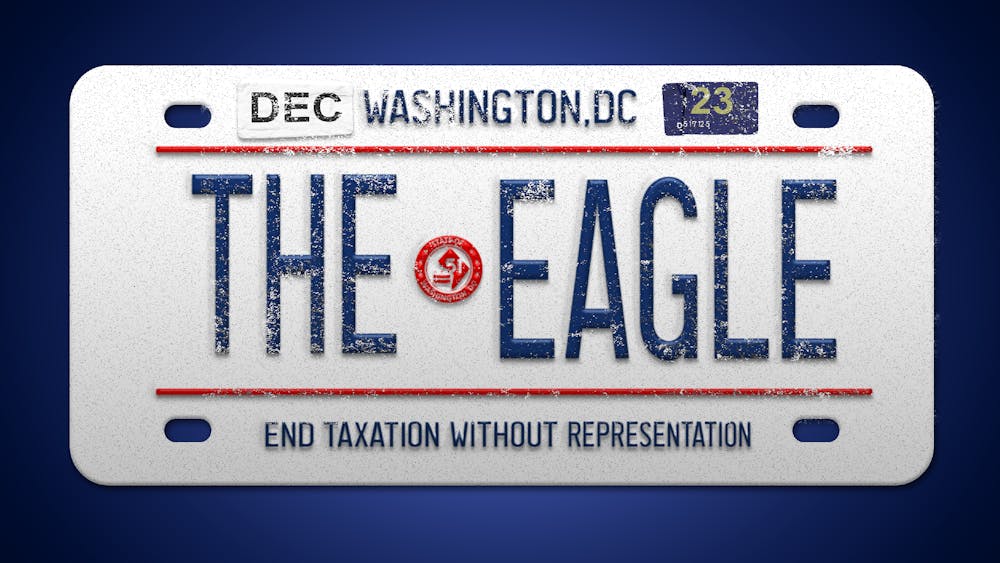From the Newsstands: This story appeared in The Eagle's December 2023 print edition. You can find the digital version here.
Long overlooked, residents of the District of Columbia have been fighting for self-governance since its founding as the nation’s capital in 1790.
D.C. is the only national capital in the democratic world that lacks a full government and voting rights. While the District has a mayor, 13 city council members and a delegate to the House of Representatives, they do not have a governor or senators, and the delegate has no vote in the House. Additionally, Congress has the power to block any D.C. legislation through what is called a congressional disapproval resolution.
“It’s just abominable,” said Patrice Snow, the director of communications at DC Vote, an advocacy organization dedicated to strengthening democracy for its residents. “You have this colonial Congress from random places like Arizona and Georgia and South Carolina who want to tell the 700,000 tax-paying residents of Washington, D.C. how to rule itself. It’s ironic that those who live in the shadow of our democracy … are treated as second-class citizens.”
D.C. residents could not vote for president until 1964, and the District’s current governmental structure wasn’t established until 1973 under the District of Columbia Home Rule Act. The prior system came from segregationists who convinced Congress to eliminate local government with the Organic Act of 1878 in an effort to hurt Black male suffrage.
The fight for statehood
In September 2019, D.C. held a historic hearing for H.R. 51, a statehood bill that would limit the District to a two-mile enclave including the White House, Capitol Hill and the Supreme Court. The rest of the District would become the new state of Washington, Douglass Commonwealth. Among the hearing speakers for statehood was Maryland Representative and Washington College of Law Professor Emeritus Jamie Raskin.
In an interview with The Eagle, Raskin said D.C.’s current system is “just a halfway condition for people who live in the District of Columbia, and it really betrays the principles of democracy and equality under the Constitution.”
H.R. 51 passed the House both in 2019 and 2021, but didn’t get past the Senate. Many Republicans in Congress oppose statehood because it would likely guarantee two more Democratic seats in the Senate due to D.C.’s leftleaning political makeup. Anna Reid Jhirad explored this concept in her 2021 documentary “The Last Battlefront: Quest for the Vote in Washington DC,” which analyzed the District’s political and racial history.
“I’m hoping that people can see that the District has been ignored and overseen because they just see the beautiful monuments … and they don’t realize that there’s a real problem,” Jhirad said. “There’s no real democracy.”
Jhirad said this issue goes far beyond the District. “The dilemma that D.C. faces are lessons for the whole of the country and that we really have to fight against efforts to control voting,” Jhirad said. “We really have to see how precious voting rights are.”
Earlier this year, Congress blocked multiple D.C. bills from passing, such as the Revised Criminal Code Act, which would have comprehensively updated D.C.’s criminal code for the first time since 1901.
D.C.’s Delegate to the House Eleanor Holmes Norton, who introduced H.R. 51, said in a press release, “I can only conclude that the Republican leadership believes that D.C. residents, a majority of whom are Black and Brown, are either unworthy or incapable of governing themselves.”
“We always say at DC Vote that it’s a matter of when, not if, we finally achieve D.C. statehood and become the 51st state of the union,” Snow said. “It’s been a long, arduous process; we’re still working, we’re still fighting.”
This article was edited by Jordan Young and Abigail Pritchard. Copy editing done by Isabelle Kravis, Luna Jinks and Emilia Rodriguez.





